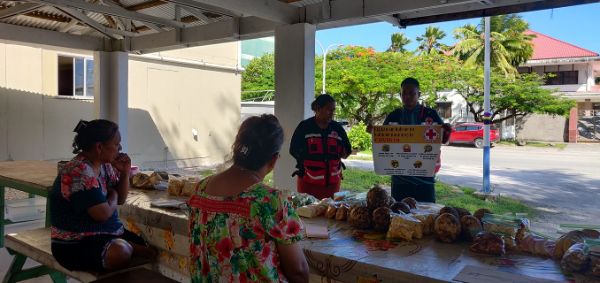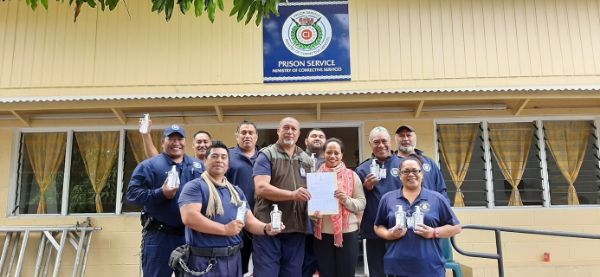COVID-19: Over 6,650 Detainees In The Pacific Region Receive Assistance

Small Pacific Island Nations are highly vulnerable when it comes to natural disasters and pandemics.
With its long experience working on humanitarian issues in prisons, including advising on the management of infectious diseases, the International Committee of the Red Cross (ICRC) is engaging significantly on the COVID-19 response in prisons globally, including in the Pacific region.
Since March, the ICRC has been sharing expert advice on prevention, preparedness and response to COVID-19 in prison settings with Correctional Services across the region. It also set up an online forum for peer-to-peer exchange between national services in the region. The ICRC provides bilateral advice and guidance to Corrections Commissioners and Prison Health Staff.
In Fiji, the ICRC has assisted the Fiji Corrections Service (FCS) with personal hygiene material (body and laundry soap), disinfection material (hand sanitizer, chlorine and bleach), and PPE (disposable aprons) for the use of detainees and prison staff.
The ICRC also provided the FCS with 10 laptop computers and 10 modems to allow detainees to have video calls with their lawyers and relatives during the suspension of visits by legal counsel and families. These were installed in remand and Correctional centres.
Commissioner of Fiji Corrections, Commander Francis Kean, told local media that the initiative would allow those under their care to contact family members and to obtain legal counsel without the need to travel and risk COVID-19 infection.
In the Solomon Islands, the ICRC has supported the Corrections Service to put a system in place that allows all detainees to make weekly telephone calls to their relatives and lawyers whilst family visits are suspended. The ICRC also provided two tents for the main prison in Honiara where staff and detainees leaving or entering the facility are screened for COVID-19 symptoms.

Personal hygiene materials (body soap, laundry soap) and disinfection materials (hand sanitizer, bleach, chlorine) have, with the help of the respective National Society, been donated to the Corrections Service of the Cook Islands, Marshall Islands, Samoa and Solomon Islands, to support their effort to ensure hygiene in the correctional centres and so help prevent COVID-19 outbreaks. In PNG, the ICRC has supported detainees and staff in correction institutions and in police lock-ups with hygiene and disinfection material, through setting up of hand-washing stations and with information sessions on COVID-19 prevention.
ICRC’s Protection Coordinator, Bjoern Rahm said: “So far, more than 6650 detainees and 1600 prison staff have benefited from ICRC assistance in the Pacific region. We will continue to support Correction Services in the region to keep detainees, staff and families safe from the pandemic.”
ICRC has for years supported Pacific Island National Societies (PINS) in their communication work, disseminating about the Red Cross and Red Crescent Movement and its humanitarian principles and international humanitarian law - raising their profile and reach. This support takes the form of technical help via ongoing coaching and periodic training as well as funding. Since 2019, twelve PINS (Cook Islands, Fiji, Kiribati, Marshall Islands, Federated States of Micronesia, Palau, Papua New Guinea, Samoa, Solomon Islands, Tonga, Tuvalu, Vanuatu) have been benefitting from this support.

With the onset of the COVID-19 emergency, all the PINS were able to immediately take action for public awareness at national level, in coordination with their authorities and with the International Federation of Red Cross and Red Crescent Societies (IFRC) with health and hygiene messaging. This was the primary component of PINS response in the early phase of the crisis and the ICRC-supported communication units have been a key resource.
Cook Islands Red Cross Secretary-General, Fine Tu’itupou-Arnold said: "Getting the message out has never been more important. Our people across the Pacific need to be informed and reassured, while whole countries must quickly learn of new ways of keeping safe. Communication is a vital tool in the fight against COVID-19. ICRC's swift and generous response has been a huge help in shaping our COVID-19 response. Past epidemics have hit the Pacific hard. We owe ICRC a debt of gratitude for the part it has played in this region humanitarian response which has so far kept COVID-19 from a number of our countries and has helped to flatten the curve elsewhere."
ICRC took steps to facilitate PINS work by allowing the re-purposing of communication budgets from planned activities to the emergency communication needs around the pandemic. ICRC expedited fund transfers and adapted some internal processes to ensure PINS had funds available in-country as early as possible.


 KidsRights: KidsRights Index 2025 Now Available
KidsRights: KidsRights Index 2025 Now Available CNS: We Can Do Better So That All People With HIV Live Healthy Normal Lifespans
CNS: We Can Do Better So That All People With HIV Live Healthy Normal Lifespans John Divinagracia, IMI: The Evolution Of Mankind’s First Voice - How Drums Shape The Human Story
John Divinagracia, IMI: The Evolution Of Mankind’s First Voice - How Drums Shape The Human Story Deep Sea Mining Campaign: New Report Exposes Impossible Metals’ Claims As Scientifically Baseless
Deep Sea Mining Campaign: New Report Exposes Impossible Metals’ Claims As Scientifically Baseless Pacific Whale Fund: First Māori Voice Opens UN Oceans Conference, Pushing For Marine Legal Rights
Pacific Whale Fund: First Māori Voice Opens UN Oceans Conference, Pushing For Marine Legal Rights International AIDS Society: IAS Announces Rio De Janeiro As Host City For AIDS 2026
International AIDS Society: IAS Announces Rio De Janeiro As Host City For AIDS 2026